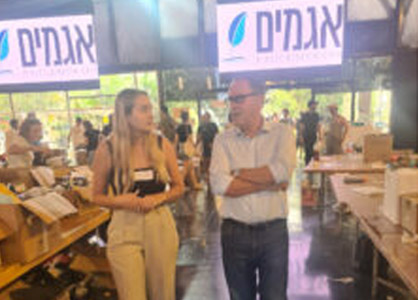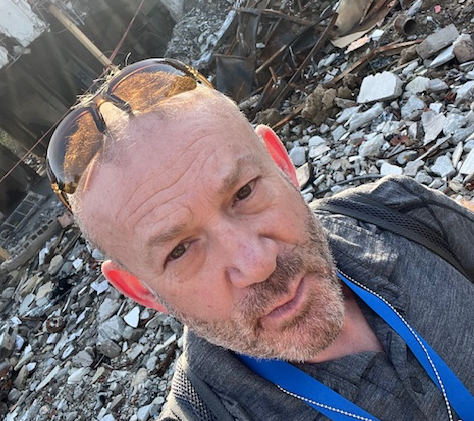
One In Six Public Health Workers Won’t Work In Emergency Flu Pandemic
One In Six Public Health Workers Won’t Work In Emergency Flu Pandemic
July 28, 2009
BEER-SHEVA, ISRAEL — July 28, 2009 –- A study conducted by researchers at Ben-Gurion University of the Negev (BGU) and John Hopkins Bloomberg School of Public Health indicates that approximately 16 percent of public health care workers will not report for work in a pandemic flu emergency, regardless of the severity.
The study just published in the peer-reviewed online journal PLOS ONE was conducted among 1,835 public health workers in Minnesota, Ohio and West Virginia from November 2006 to December 2007.
“We found belief in the importance of one’s work was strongly associated with a willingness to report to work in an emergency,” said co-author Ran Balicer, M.D., Ph.D., M.P.H., senior lecturer in the Department of Epidemiology at Ben-Gurion University of the Negev in Israel, and joint editor of the Israeli Ministry of Health Pandemic Preparedness Plan.
“Our results could help preparedness planners identify workforce needs and develop strategies for improving worker response.”
According to the survey, public health workers who were both “concerned” about the threat posed by a pandemic, and who were “confident” that they could fulfill their response roles and have a meaningful impact on the situation, were 31 times more likely to respond to work in an emergency than those who perceived the threat low and had low levels of confidence.
Workers whose perception of the threat was “low” but who strongly believed in the importance of their job were 18 times more likely to say they “would respond” compared to those in the “low threat/low efficacy” group.
The survey analysis was based on Witte’s Extended Parallel Process Model (EPPM), used for understanding adaptive behavior in the face of unknown risk.
It examines the relative influences of perceived threat and efficacy on public health workers’ response willingness to pandemic influenza.
Willingness of health responders to report to duty during an influenza pandemic is a major concern given the “inevitable” nature of this threat and its associated challenges, including worldwide morbidity, mortality and social disruption,” explains Dr. Balicer.
The study concludes that in the context of pandemic influenza planning, the EPPM provides a useful framework to inform nuanced understanding of baseline levels of – and gaps in – local public health workers’ response willingness.
Within local health departments, “concerned and confident” employees are most likely to be willing to respond.
This finding may allow public health agencies to design, implement and evaluate training programs focused on emergency response attitudes in health departments.
“Employee response is a critical component of preparedness planning, yet it is often overlooked,” said Daniel Barnett, M.D., M.P.H., co-author of the study and assistant professor in the Department of Environmental Health Sciences at the Bloomberg School of Public Health.
“Our study is an attempt to understand the underlying factors that determine an employee’s willingness to respond in an emergency.”
The researchers also offer some recommendations as any amount of additional assistance will make a difference in response to an influenza pandemic.
* First step is to better educate public health workers as to their designated roles during this emergency scenario, and then motivate them with an understanding of why this role makes a difference.
If a specific designated role cannot be predetermined, a set of potential roles have to be defined and adequately introduced to all relevant workers, up to a point at which they will feel confident in their ability to perform their duty, and perceive it as important.
* Downplaying the threat of the scenario to calm the fears of the workers is not an advisable approach. A sense of threat is an important component in the workers’ motivation to prepare for the event and to respond to it.
* Personal safety assurances of workers can and should be provided as part of training. It is important to note that 24 percent of the respondents did not perceive their work environment as safe, and 15 percent of the respondents felt they could not safely arrive to work.
Despite the growing research examining willingness to respond to large-scale emergencies, there remains a gap in public health preparedness literature on training approaches that explicitly address response willingness as a discrete outcome.
The research was funded by the U.S. Center for Disease Control’s (CDC) Centers for Public Health Preparedness program, and by CDC’s Preparedness and Emergency Response Research Centers program.
Barnett DJ, Balicer RD, Thompson CB, Storey JD, Omer SB, et al. (2009) Assessment of Local Public Health Workers’ Willingness to Respond to Pandemic Influenza through Application of the Extended Parallel Process Model. PLoS ONE 4(7): e6365. doi:10.1371/journal.pone.0006365
ABOUT AMERICANS FOR BEN-GURION UNIVERSITY
By supporting a world-class academic institution that not only nurtures the Negev, but also shares its expertise locally and globally, Americans for Ben-Gurion University engages a community of Americans who are committed to improving the world. David Ben-Gurion envisioned that Israel’s future would be forged in the Negev. The cutting-edge research carried out at Ben-Gurion University drives that vision by sustaining a desert Silicon Valley, with the “Stanford of the Negev” at its center. The Americans for Ben-Gurion University movement supports a 21st century unifying vision for Israel by rallying around BGU’s remarkable work and role as an apolitical beacon of light in the Negev desert.
About Ben-Gurion University of the Negev
Ben-Gurion University of the Negev embraces the endless potential we have as individuals and as a commonality to adapt and to thrive in changing environments. Inspired by our location in the desert, we aim to discover, to create, and to develop solutions to dynamic challenges, to pose questions that have yet to be asked, and to push beyond the boundaries of the commonly accepted and possible.
We are proud to be a central force for inclusion, diversity and innovation in Israel, and we strive to extend the Negev’s potential and our entrepreneurial spirit throughout the world. For example, the multi-disciplinary School for Sustainability and Climate Change at BGU leverages over 50 years of expertise on living and thriving in the desert into scalable solutions for people everywhere.
BGU at a glance:
20,000 students | 800 senior faculty | 3 campuses | 6 faculties: humanities & social sciences, health sciences, engineering sciences, natural sciences, business & management, and desert research.
For all press inquiries, please contact:
James Fattal, J Cubed Communications
516.289.1496



